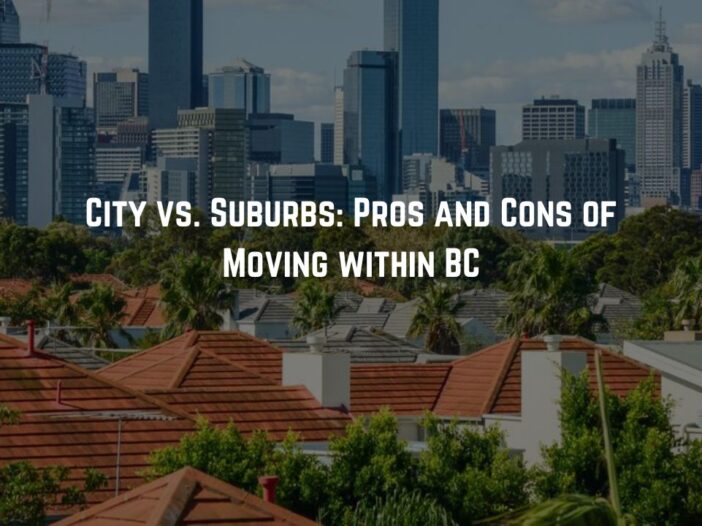
Considering a move within British Columbia? Explore the pros and cons of living in the city vs the suburbs to help you make an informed decision. Discover the benefits of urban living and the advantages of suburban life, along with important factors to consider when choosing your next home in beautiful BC.
Are you planning a move within British Columbia and torn between the allure of city life and the tranquility of the suburbs? Choosing between living in the city or suburbs is a significant decision that depends on your lifestyle, preferences, and priorities. In this blog post, we will delve into the pros and cons of both options to help you make an informed choice. Whether you crave the vibrant energy of the city or the peaceful charm of suburban living, explore the factors that will impact your decision when moving within beautiful BC.
1. City Living: Pros and Cons
Living in a city like Vancouver or Victoria comes with its own set of advantages and considerations. Here are some pros and cons to help you evaluate city living:
Pros:
Vibrant Lifestyle:
Cities offer a bustling atmosphere with an abundance of cultural events, nightlife, and diverse entertainment options.
Convenience and Accessibility:
Cities typically provide excellent public transportation networks, proximity to amenities, and a wide range of services.
Career Opportunities:
Urban areas often boast a larger job market, career advancement prospects, and greater networking opportunities.
Cultural and Culinary Delights:
Cities are cultural hubs, offering a wide array of museums, art galleries, theaters, and a diverse culinary scene.
Cons:
Higher Cost of Living:
Cities tend to have higher housing prices, increased living expenses, and often require more financial resources.
Crowded and Noisy:
Urban areas can be crowded, congested, and noisy, especially in popular neighborhoods or during peak hours.
Limited Space:
Living spaces in cities may be smaller and more expensive, with limited outdoor areas and green spaces.
Higher Stress Levels:
The fast-paced nature of city life can lead to higher stress levels and a more competitive environment.
2. Suburban Living: Pros and Cons
If you prefer a quieter and more relaxed lifestyle, the suburbs might be a better fit for you. Consider the following pros and cons of suburban living in BC:
Pros:
Peaceful and Family-Friendly:
Suburbs offer a quieter environment, with less traffic, noise pollution, and a stronger sense of community.
More Space:
Suburban homes generally offer more space, larger yards, and a greater emphasis on outdoor living.
Affordability:
Housing prices and living costs in the suburbs are often lower compared to urban areas, allowing for more affordable homeownership options.
Better Schools and Safety:
Suburbs are known for their quality school districts, safer neighborhoods, and a family-oriented atmosphere.
Cons:
Commute and Transportation:
Suburbs often require longer commutes, especially if you work in the city, and may have limited public transportation options.
Less Diversity in Amenities:
While suburbs have their own amenities, they may offer fewer cultural, dining, and entertainment options compared to cities.
Dependency on Vehicles:
Suburban living usually relies heavily on private vehicles, which can result in increased transportation expenses and environmental impact.
Potential for Isolation:
Living in the suburbs can sometimes feel isolated, especially if you prefer the vibrant energy and social opportunities of the city.
Conclusion:
When deciding between city living and suburban life within British Columbia, it’s crucial to weigh the pros and cons based on your lifestyle preferences and priorities. The city offers convenience, cultural experiences, and career opportunities, while the suburbs provide affordability, spaciousness, and a more tranquil environment. Consider factors such as your work-life balance, proximity to amenities, and your long-term goals to determine which option aligns best with your needs. Ultimately, the decision is personal, and it’s essential to find the right balance between urban excitement and suburban serenity for your next move within beautiful British Columbia.
FAQs related to choosing between city living and suburban life in British Columbia:
Are there any affordable housing options in the city?
Even the high cost of housing in places like Vancouver and Victoria, there are still some options for more affordable housing. Think about searching for apartments or condos outside of the downtown area or in less convenient neighbourhoods.
Can I find good schools in the suburbs?
Yes, excellent school districts with a focus on quality education are common in British Columbia’s suburbs. Do some research on the specific suburbs you are interested in to find out more about the educational options and schools there.
What are the transportation options in the suburbs?
Compared to cities, suburbs may provide fewer alternatives for transportation. It’s crucial to take into account your transport requirements and if you would like a journey that is perhaps longer from the suburbs or one that is shorter in the city. If you depend on transportation, find out if the potential suburbs have trains or buses.
Are there cultural and entertainment options in the suburbs?
The cultural and relaxation possibilities in cities are more varied, but suburbs also have their own benefits. In suburban locations, you could discover neighbourhood community centres, parks, outdoor activities, and smaller-scale events. Think about your hobbies and how essential it is to you to have access to particular cultural or entertainment locations.
How do I balance the tranquility of the suburbs with the vibrancy of the city?
If you can’t decide between the two lifestyles, you can think about moving to a suburb that is closer to the city. In this manner, you may take advantage of a more peaceful environment while still having easy access to the city’s attractions and cultural activities. Look at the suburbs that have good transit connections to the city.
What are the employment opportunities in the suburbs?
When compared to the suburbs, cities often have a larger job market and greater options for professional progression. This is especially true for local companies, healthcare, and education. To find out if the work market in the suburbs you are interested in fits with your professional goals, do some research on it.
How does the cost of living compare between the city and suburbs?
In general, the cost of living in cities is higher than it is in the suburbs. Cities frequently demand greater financial resources due to their higher housing costs, rising living expenditures, and other factors. On the other side, suburbs often provide more cheap housing alternatives and lower cost of living. When selecting a choice, take your budget and financial status into account.

